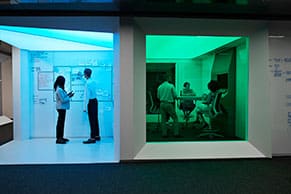As businesses grow, they outgrow management methods and tools that previously served them well. For instance, software such as basic accounting systems won’t provide sufficient insights into operational efficiency or support approval workflows for purchasing and billing. Spreadsheets that once seemed adequate for inventory management become ineffective as business becomes more complex. Sales teams won’t have the data they need to understand available capacity as operations become more complex.
Enterprise resource planning (ERP) systems aim to address these and many other business management challenges that might otherwise impede business growth and efficiency.
What Is Small Business ERP?
ERP is modular business management software that supports cross-departmental system integration, and for small businesses it has specific and evolving needs across disciplines, be it accounting, inventory, or HR. Depending on the type of business, you may have manufacturing, e-commerce, and other needs as well. With ERP software, you don’t need separate solutions to address these situations. An ERP can automate your business practices and provide you with distilled information and internal controls. While financial and accounting software are its core, ERP lets you add modules to manage each business function so you don’t need disparate systems. These manufacturing, HR, and other modules used across departments can all access and contribute to a single database as they carry out their management function, providing greater overall visibility of operational efficiency.
In this way, ERP software solves the challenge of keeping everyone on the same page when data sources are disparate. By compiling information into a central database and granting cross-departmental visibility to select personnel, ERP software ensures that your team doesn’t waste time tracking down documents, duplicating work, or sifting through seemingly contradictory data. Instead, you can focus on what truly matters and collaborate on next steps more efficiently.
ERP software for small businesses provides a one-stop shop for your organizational needs, unifying your people, core business processes, and technology across disciplines.
Key Takeaways
- ERP systems aren’t one-size-fits-all and should be evaluated for their ease of use, integration capabilities, features, benefits, and overall value to your business.
- It’s best to invest in an ERP software solution that can grow with your business.
- It’s up to business owners and their teams to implement the types of modules or applications they want in accordance with their industry and business needs.
- ERP software types vary widely. Business owners should know how and why each type is different to make the best decision for their organization.
Small Business ERP Buying Guide
Not all small business ERP software is created equal. When deciding whether to invest in an ERP solution — and if so, which one — it’s important to be informed, starting with a comprehensive evaluation.
First, know what your selection criteria are for your ERP. For instance, an ERP vendor’s expertise in your industry, a system’s customization options, and the advanced technologies — the cloud, artificial intelligence (AI), machine learning (ML) — a system employs could be critical to successfully meeting your unique business requirements. But if you don’t have a stick against which to measure these and other offerings, it will be tougher to gauge which, if any, ERP software is a true solution for you and your team.
Once you’ve established your business’s ERP software criteria, it’s important to note which key features any given software provides, what benefits it can deliver to your business, and which type of ERP software for small businesses makes the most sense for you in the long term. After all, if you want your organization to grow, it’s best to invest in an ERP solution that can grow with it.
Let’s explore each aspect of this evaluation process.
Small Business ERP Criteria
Every business is unique, so only you and your team can determine the specific criteria you should measure different ERP software against. Still, there are three essential criteria to consider, regardless of your industry.
- Ease of use: Easy can look like a lot of things — an intuitive and consistent user interface, industry-specific dashboards and KPIs tailored to your company, configurable business model templates — but it doesn’t mean basic. It means uncomplicated. The best ERP software in the world will be of little use to you if it’s too complicated for your team to operate it effectively, but an easy-to-use ERP system can save you countless headaches down the road.
- Integrations: Does your ERP connect with and allow for a seamless view of operational information across your entire organization? More specifically, does this ERP system integrate with all the distinct software running across your entire portfolio? This is why planning, vetting, and testing for holistic integration is essential with ERPs. If you don’t account for integration, you could wind up spending a lot of time, money, and effort on an application that won’t bring all your business functions under one umbrella.
- Value: Whether it’s saving money by consolidating your systems into an easily visible central application or improving the experience of new and existing customers, your ERP software should elevate the value of your business, not just maintain the status quo. If an ERP system won’t bolster consistent management of your business functions, such as establishing and automating workflows that reduce repetitive work and enforce companywide governance rules, that specific product might not be the value add you need.
Key Features of Small Business ERP
All ERP software provides core financial and accounting functionality. Beyond that, it’s up to you and your team to implement the modules or applications that meet your specific industry and business needs. Overall, however, key features of ERP software for small businesses include the following:
- HR management: Between goal management and performance reviews, time-off requests, compensation tracking, and more, your human resources department will always have a lot to juggle. An ERP software’s HR-specific modules can help your team keep everything aligned while also providing easy access to managers and other select personnel across departments.
- Financial management: Finances extend to every department. And with the ability to pull information from the central database every module contributes to, accountants and the rest of the finance department can leverage ERP financial management software to easier collect and analyze financial data. It also makes it easier to share financial information with external partners as needed.
- Inventory management: Successful inventory management often requires a wide array of tools, and ERP software provides a central platform to house all of them, helping with functions like product tracking, barcoding and tagging, and inventory forecasting.
- Customer relationship management: It’s tough to make a customer-related decision if you’re not well-informed about your customers. Some ERPs include a CRM component, arming you with the information you need by keeping a central repository of all customer data so you can best manage all the ways a customer interacts with your business.
- Supply chain management: Referring to all the activities necessary to turn raw materials into finished goods or services — not to mention the work required to deliver these goods or services to partners and customers — SCM applies to both the planning stage and the transfer and management of information and capital across the supply chain. ERP software can help you tackle the various components and processes of SCM to ensure you reap the rewards.
- Reporting and analytics: When ERP modules are implemented and actively used across departments, it’s easier to access and pull information for various reports and analytical measurements throughout your small business.
- Business intelligence: ERP and BI go hand in hand. While an ERP system serves as process management software, managing and integrating key business aspects such as financials and supply chain, BI mines ERP databases and produces dashboards and other visualizations to make it easier for stakeholders to consume actionable insights and make strategic decisions accordingly.
- Automation: ERP software can help free your team members from monotonous busywork and processes by automating these tasks and processes, saving your company time and resources that can be used in other areas.
- Manufacturing: With ERP software, you can manage procurement, plan production, and direct discrete manufacturing processes in one, unified platform while maintaining the flexibility needed to adapt as processes change over time.
- Customer service/success: With the ability to quickly draw any pertinent information — product tracking, shipping information, purchase history — your team can respond to customer questions and overall needs with greater efficiency.
Benefits of ERP Software for Small Businesses
The scope of benefits ERP software provides your organization will depend on how widely and how deeply the software is used. If you are the only one using the ERP software, you simply won’t receive certain benefits. Likewise, if you and a team of 12 all have access to the ERP software but use it only sparingly, a range of operational advantages may go unrealized.
Once fully outfitted and frequently used, here are some of the ways ERP software can benefit your small business:
- Streamlined workflows: Tedious, error-prone tasks don’t have to be done manually. ERP software can automate account reconciliations, customer billing, order processing, and more, saving you time and easing your mind.
- Workflow visibility and transparency: There’s no more need to badger each other for progress updates or hard-to-find documents. With cross-departmental workflow visibility and transparency, you and your team can lock in on your respective responsibilities with greater speed and efficiency.
- Easier decision-making: With a central database, you and your fellow decision-makers can all be on the same page. No one has to sift through duplicated and conflicting sources of information to find the data that supports informed decisions. You’ll have all the financial reports, data analytics, and other business intelligence information you need right at your fingertips.
- Improved data security: ERP solution providers take the necessary steps to ensure that the critical, sensitive data within your system is protected. With a secure and encrypted connection between your ERP vendor and your customers, you can navigate across your devices with confidence.
- Improved collaboration: By making it easy to create purchase orders, contracts, customer support records, and other information across teams, ERP software solutions remove the walls between departments, giving your people appropriate access to real-time data that helps them collaborate effectively.
Types of Small Business ERP
ERP software isn’t one-size-fits-all. Depending on your business needs, some systems will work better for you than others. When evaluating ERP software for your small business, consider the following four types of ERP:
- Industry-specific ERP: This ERP software will provide the same essential accounting, finance, and business management tools as your standard ERP system. But as the name implies, industry-specific ERP software will also offer features tailored to your industry, providing you with managerial and operational capabilities other systems won’t have. For instance, while general ERP software can be configured for general needs across industries — business intelligence, customer relationship management, accounting and financial management — pharmaceutical-specific ERP software can also be configured for lab, recipe, and formula management.
- Free ERP: Different from paid ERP software with a free trial, truly free ERP systems can be a nice starting point. You may have more limited features than a paid system — or the paid version of a free system — but you’ll still have some of the functionality of an ERP solution, likely with the ability to pay for expansion as needed. When using a free ERP, however, you may be at a disadvantage when it comes to the quality and accessibility of support, which can be crucial since open source products can have data transfer problems that vendor products tend to have shortcuts and other solutions for.
- Cloud ERP: A cloud ERP solution runs on remote servers managed by a third party as opposed to an on-premises system. With this, you and your team will generally be able to access the cloud ERP software through a web browser, granting you greater flexibility and boosting efficiency, as your access to information is less dependent on your location. There are trade-offs for this flexibility: On-premises ERP allows for more controlled implementation and more expansive customization options than cloud ERP; conversely, cloud ERP allows for increased and more rapid scalability, lower infrastructure costs, and greater data security than on-premises ERP.
- SMB-specific ERP: Just as you may have unique ERP needs in accordance with your specific industry, the size of your business can also dictate your needs. If you’re a small-to-medium-sized business (SMB), you’ll likely require an ERP designed for small businesses that can adapt with and bolster company growth while simultaneously empowering a smaller team to handle multiple responsibilities. In the same way, you might not need the same currency conversion and language translation tools that a global corporation might.
Choose the Best ERP for Small Businesses. Choose NetSuite ERP.
NetSuite ERP is an all-in-one cloud business management solution serving small to midsize businesses across industries, offering real-time insights, better customer service, zero-trust security, and reduced supply chain costs. NetSuite ERP lets you start small when it comes to system modules, keeping the overall cost low, and then grow as needed as your organization expands. Learn how NetSuite ERP can take your small business to the next level.
Switching From QuickBooks to NetSuite
This is why organizations often upgrade from QuickBooks to NetSuite: While both offer software designed to help businesses manage their accounting needs, NetSuite delivers a significantly larger depth of features. Thinking about making the switch? Learn more about why switching from QuickBooks to NetSuite may be the best move for your business.

Not every small business is ready to see significant benefits from ERP software. But if you’ve reached a point where ERP software can add value to your business, it’s wise to start evaluating different systems — NetSuite included — sooner than later.









